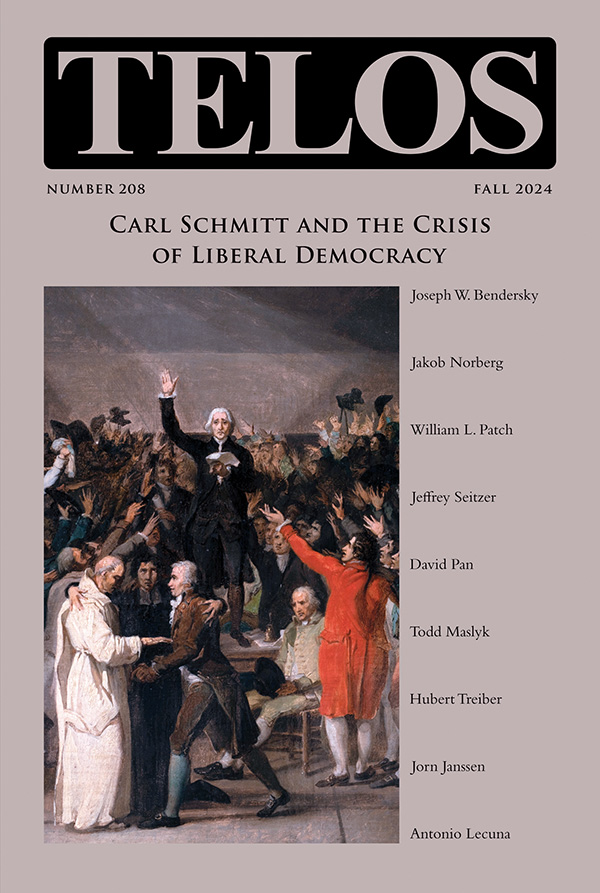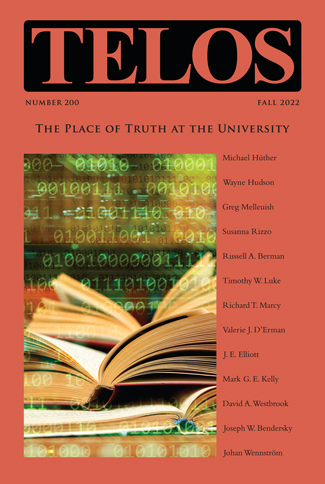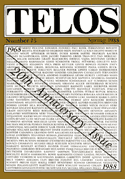By David Pan · Friday, October 18, 2024 Telos 208 (Fall 2024): Carl Schmitt and the Crisis of Liberal Democracy is now available for purchase in our store. Individual subscriptions to Telos are also available in both print and online formats.
 It hardly needs mentioning that liberal democracy is facing a number of threats today, both internal and external. Even if the political parties in the United States cannot agree on the main source of the threats, they both believe that democracy is in danger. Democrats point to the January 6 Capitol riot and Trump’s role in it as examples of the way in which liberal democratic procedures are being directly attacked. Republicans point to the Democratic-backed court cases against Trump as well as the FBI’s favoritism toward Democrats in their public announcements before elections as evidence that the legal system and the administrative state are being used to shut out political opponents. Both parties point to violations of free speech rights at college campuses, yet they also both seek to establish limits to those rights in defense of liberal democratic values. It hardly needs mentioning that liberal democracy is facing a number of threats today, both internal and external. Even if the political parties in the United States cannot agree on the main source of the threats, they both believe that democracy is in danger. Democrats point to the January 6 Capitol riot and Trump’s role in it as examples of the way in which liberal democratic procedures are being directly attacked. Republicans point to the Democratic-backed court cases against Trump as well as the FBI’s favoritism toward Democrats in their public announcements before elections as evidence that the legal system and the administrative state are being used to shut out political opponents. Both parties point to violations of free speech rights at college campuses, yet they also both seek to establish limits to those rights in defense of liberal democratic values.
Meanwhile, authoritarian governments in places such as China, Russia, Iran, and North Korea have becoming increasingly aggressive in opposing liberal democracies as threats to their own legitimacy. In doing so, they have attempted to provide theoretical justifications for their authoritarian rule that are based in anti-Western and anti-colonial discourses that align with critiques of the West advanced by left-leaning academics in liberal democracies.
Because they are based on freedom of expression and freedom of conscience, liberal democracies must allow open public spheres whose dynamics could take unforeseen directions that end up undermining the cultural and procedural foundations of liberal democratic governance. While the American Revolution provides the best example of the success of liberal democracy, the French Revolution and the Weimar Republic demonstrate spectacular failures. Outside of the West, the contrast between Taiwan and China and between Indonesian democracy and the Iranian Revolution indicate that we can find the same contrasts between failure and success in East Asia and in the Islamic world.
Continue reading →
By Telos Press · Wednesday, November 23, 2022 In today’s episode of the Telos Press Podcast, David Pan talks with Richard T. Marcy and Valerie J. D’Erman about their article “The Sensemaking and Construction of Political Narratives in Academic Settings,” from Telos 200 (Fall 2022). An excerpt of the article appears here. In their conversation they discuss Max Weber’s distinction between political advocacy and university teaching, and how this distinction is relevant for analyzing territorial acknowledgments; why the framework of narrative sensemaking is appropriate for analyzing territorial acknowledgments; the way in which territorial acknowledgments have developed through a process of sensebreaking, sensegiving, and senselocking; how the territorial acknowledgment represents a kind of truth in academia; Weber’s distinction between neutrality and objectivity and his argument that all research inevitably has some sort of value orientation; and how that value orientation should function in the university, particularly with regard to the university’s civic function. If your university has an online subscription to Telos, you can read the full article at the Telos Online website. For non-subscribers, learn how your university can begin a subscription to Telos at our library recommendation page. Print copies of Telos 200 are available for purchase in our online store.
Continue reading →
By David Pan · Monday, October 3, 2022 Telos 200 (Fall 2022): The Place of Truth at the University is now available for purchase in our store. Individual subscriptions to Telos are also available in both print and online formats.
 The place of truth at the university has always been elsewhere. Scientific conclusions are after all hypotheses, subject to continuing examination and critique in a process that forever defers the arrival at a final truth. In addition to this unbridgeable temporal distance from truth, there is a spatial distance to the extent that the university is subject to a larger purposive context that stands outside of scientific activity itself. A researcher can be objective by being non-prejudicial in collecting facts and weighing arguments but can never be neutral in terms of the goals of the research, which must always be established before the research begins and from outside of the research project itself.[1] Research cannot begin until an interest in some question has been expressed, and such an interest has generally not been up to the researcher to decide. Whether the goal of medical research will be to protect humans from a virus or attack humans with a virus will be determined by the sponsor of the research rather than the researcher, who at best may decline to take part in some forms of research. If the determiners of the goals of the university are not the professors themselves but the society that sponsors their work, it is within this external values framework that the truth of the university must be found. The place of truth at the university has always been elsewhere. Scientific conclusions are after all hypotheses, subject to continuing examination and critique in a process that forever defers the arrival at a final truth. In addition to this unbridgeable temporal distance from truth, there is a spatial distance to the extent that the university is subject to a larger purposive context that stands outside of scientific activity itself. A researcher can be objective by being non-prejudicial in collecting facts and weighing arguments but can never be neutral in terms of the goals of the research, which must always be established before the research begins and from outside of the research project itself.[1] Research cannot begin until an interest in some question has been expressed, and such an interest has generally not been up to the researcher to decide. Whether the goal of medical research will be to protect humans from a virus or attack humans with a virus will be determined by the sponsor of the research rather than the researcher, who at best may decline to take part in some forms of research. If the determiners of the goals of the university are not the professors themselves but the society that sponsors their work, it is within this external values framework that the truth of the university must be found.
Continue reading →
By Robert Wyllie · Tuesday, June 11, 2013 As an occasional feature on TELOSscope, we highlight a past Telos article whose critical insights continue to illuminate our thinking and challenge our assumptions. Today, Robert Wyllie looks at Luciano Pellicani’s “Weber and the Myth of Calvinism,” from Telos 75 (Spring 1988).
 In his exchange with Adrian Pabst in Telos 162, Luciano Pellicani argues that the United States’ constitutional founding comes “in clear opposition to the theocratic model of the Puritan Fathers” (160). The Founding Fathers’ radical commitment to the Enlightenment, Pellicani claims, was the opening salvo in the contemporary culture war still raging in America. On one side there has always been the “commercial society ruled by a wealthy bourgeoisie” (155) aligned with the Enlightenment critique of religion (the deism of Paine and Jefferson) behind a secular constitution. On the other side is a populist religious opposition to the Constitution. The medieval and theocratic spirit of the Puritans, Pellicani explains, runs through the eighteenth-century Great Awakening all the way to the modern Christian Coalition. Pabst’s counter-argument proposes that Pellicani’s argument “is all too Protestant in its divorce of rationality from belief” (171). According to Pabst, Calvinism contributed decisively to the secularization of European society and the growth of North American capitalism (166). Pellicani’s hostility to this thesis has a long history in the pages of Telos. In his exchange with Adrian Pabst in Telos 162, Luciano Pellicani argues that the United States’ constitutional founding comes “in clear opposition to the theocratic model of the Puritan Fathers” (160). The Founding Fathers’ radical commitment to the Enlightenment, Pellicani claims, was the opening salvo in the contemporary culture war still raging in America. On one side there has always been the “commercial society ruled by a wealthy bourgeoisie” (155) aligned with the Enlightenment critique of religion (the deism of Paine and Jefferson) behind a secular constitution. On the other side is a populist religious opposition to the Constitution. The medieval and theocratic spirit of the Puritans, Pellicani explains, runs through the eighteenth-century Great Awakening all the way to the modern Christian Coalition. Pabst’s counter-argument proposes that Pellicani’s argument “is all too Protestant in its divorce of rationality from belief” (171). According to Pabst, Calvinism contributed decisively to the secularization of European society and the growth of North American capitalism (166). Pellicani’s hostility to this thesis has a long history in the pages of Telos.
Continue reading →
|
|
 It hardly needs mentioning that liberal democracy is facing a number of threats today, both internal and external. Even if the political parties in the United States cannot agree on the main source of the threats, they both believe that democracy is in danger. Democrats point to the January 6 Capitol riot and Trump’s role in it as examples of the way in which liberal democratic procedures are being directly attacked. Republicans point to the Democratic-backed court cases against Trump as well as the FBI’s favoritism toward Democrats in their public announcements before elections as evidence that the legal system and the administrative state are being used to shut out political opponents. Both parties point to violations of free speech rights at college campuses, yet they also both seek to establish limits to those rights in defense of liberal democratic values.
It hardly needs mentioning that liberal democracy is facing a number of threats today, both internal and external. Even if the political parties in the United States cannot agree on the main source of the threats, they both believe that democracy is in danger. Democrats point to the January 6 Capitol riot and Trump’s role in it as examples of the way in which liberal democratic procedures are being directly attacked. Republicans point to the Democratic-backed court cases against Trump as well as the FBI’s favoritism toward Democrats in their public announcements before elections as evidence that the legal system and the administrative state are being used to shut out political opponents. Both parties point to violations of free speech rights at college campuses, yet they also both seek to establish limits to those rights in defense of liberal democratic values. 
 In his exchange with Adrian Pabst in
In his exchange with Adrian Pabst in 

